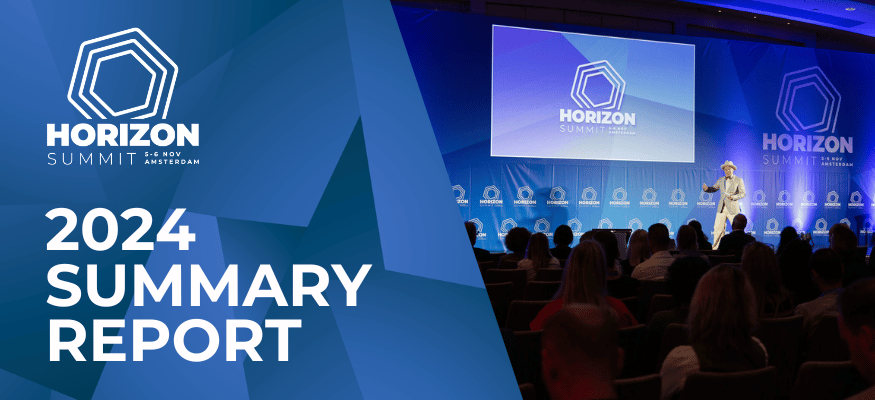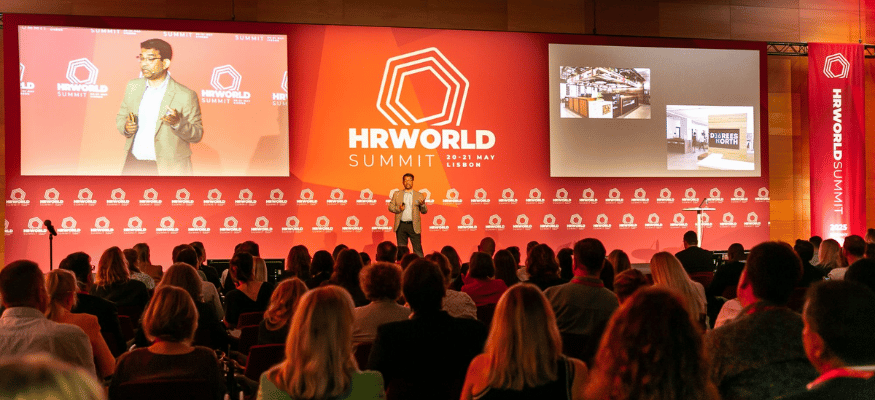Performance and engagement are at the heart of building organizations where people thrive and grow
For decades, organizations have pursued performance through structure, compliance, and control. Annual reviews, bonus incentives, and hierarchical oversight promised predictability. But they’ve also caused disengagement, burnout, and a disconnect between people and purpose. As change accelerates and technology reshapes work, a new question arises: What does performance mean when machines are efficient, but meaning is rare?
At the Horizon Summit 2025, this question takes center stage. In sessions and discussions, HR leaders, researchers, and practitioners are reimagining performance management and employee engagement, not as evaluation systems, but as frameworks for human growth.
The most radical challenge comes from Otti Vogt and Antoinette Weibel, co-founders of Good Organizations and authors of the Freedom to Flourish Manifesto. Their call to action is clear: organizations must move beyond seeing people as resources to optimize and instead focus on social value, personal growth, and ethical interdependence.
In their session “From Agile to Excellence,” they explore why many transformation efforts fail. Often, it’s because the hidden assumptions behind metrics, targets, and incentives are left unquestioned. By introducing a “colour lens” to understand organizational paradigms, they encourage leaders to look beyond compliance and toward a new way of working—one built on purpose, trust, and shared flourishing.
This shift isn’t just philosophical. In their follow-up, “From Insight to Action,” Vogt and Weibel offer a practical framework—ARC—for transforming governance, performance, and culture. Using new case studies from global organizations, they show how HR can lead systemic change from within, moving away from short-term KPIs and toward long-term ecosystem health.
The Freedom to Flourish Manifesto, created by contributors from business and academia, outlines 11 principles for human-centered performance. It challenges rankings and bonus-driven behaviors, replacing them with co-created goals, team accountability, and forward-looking feedback. The key idea: human potential isn’t measured by annual reviews—it’s amplified in environments that foster agency, connection, and growth.
That idea is echoed in the session “Capability Multiplication,” which discusses how performance systems can enhance, rather than limit, human contribution. Instead of just tracking output, innovative organizations design workplaces that unlock hidden potential through trust, support, and systemic enablement. In this view, high performance isn’t about working harder—it’s about working in ways that bring out the best in people.
But flourishing doesn’t occur in isolation. One of today’s key challenges is maintaining engagement in remote-first, AI-augmented workplaces. In the track “Employee Engagement: The New Rules of Work,” multiple sessions explore how to build culture, connection, and care when people might never meet face-to-face.
In “Culture Building in the Remote-First Workplace,” the limits of traditional engagement strategies are exposed. Without shared physical spaces or synchronous interaction, companies must create a sense of belonging without relying on office rituals. This involves designing digital-first cultural practices and embracing flexibility without losing identity.
Well-being is also a central driver of performance. In “Data-Driven Wellness, People-Driven Performance,” Jay Connolly, Global Chief People Officer at Baker McKenzie, argues that well-being should be embedded into organizational DNA—not treated as a perk, but as a strategic lever. Healthy, supported employees naturally perform better. However, this needs data-informed strategies that respect empathy and ethical handling of personal data.
As AI takes over routine tasks, a deeper tension emerges. In “When AI Takes Over but Engagement Still Matters,” leaders examine how automation might diminish meaning, especially when it replaces the most engaging parts of a role. With machines surpassing humans in many tasks, the role of work in identity and purpose must be reconsidered. What motivates people when algorithms overshadow their technical value? The answer may lie in cultivating distinctly human skills: creativity, collaboration, and ethical judgment.
Overall, these sessions mark a turning point in the future of work. Performance is no longer just about outputs or individual ratings. Engagement isn’t a quarterly metric—it’s a long-term investment in human sustainability. And leadership must shift from merely driving results to designing systems that promote thriving.
The path ahead isn’t without obstacles. Legacy processes and industrial-era mindsets remain deeply rooted. But the Horizon Summit 2025 makes it clear that the most innovative organizations are already experimenting, trying new feedback models, cultural frameworks, and people-first performance systems.
While the old tools of productivity—control, compliance, and evaluation—may have achieved efficiency, they’re not enough to build resilience, creativity, and long-term value. For that, we need to prioritize freedom, flourishing, and purpose—not as soft ideas, but as strategic priorities shaping the future of performance.









